Analysis of Tourism Policy and Planning for Affordable Housing
VerifiedAdded on 2022/08/01
|7
|2615
|24
Report
AI Summary
This report examines the crisis of affordable accommodation for tourism workers in British Columbia, analyzing the recommendations of the Tourism Industry Association of British Columbia (TIABC). It explores the implications of policy creation at both municipal and provincial levels, considering the complexities of short-term rentals and tax exemptions. The report evaluates the effectiveness of policy instruments, such as eliminating MRDT and PST exemptions for small property owners. It argues for the development of new policies, advocating for tax reductions for traditional accommodation providers and measures to protect property owners' interests. The report recommends these specific policies, justifying their potential impact on reducing rental costs and increasing the supply of affordable housing, ultimately aiming to address the critical shortage of accommodation for tourism workers in B.C. This report underscores the importance of targeted policies that address the core issues of the accommodation crisis and promote a sustainable tourism industry.
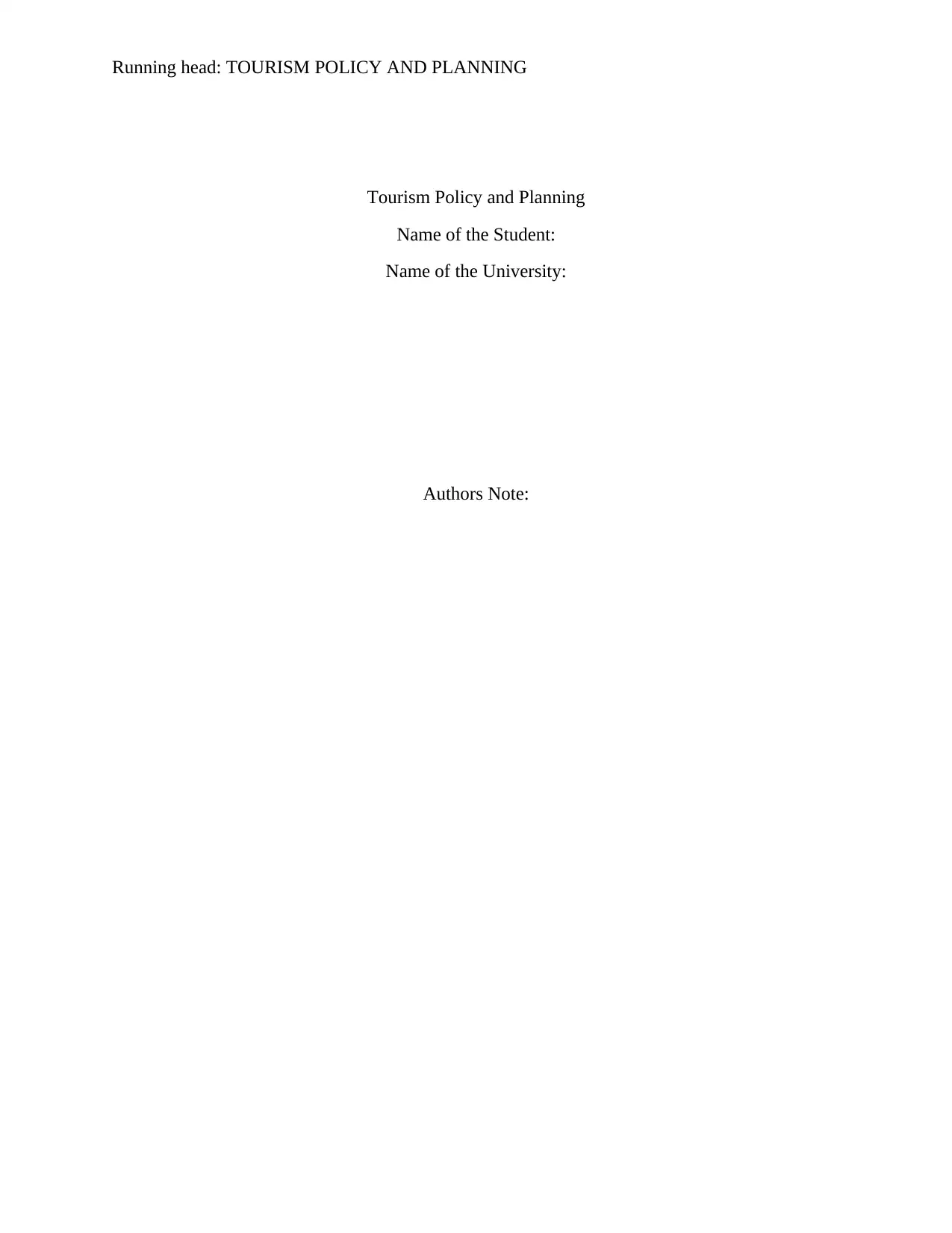
Running head: TOURISM POLICY AND PLANNING
Tourism Policy and Planning
Name of the Student:
Name of the University:
Authors Note:
Tourism Policy and Planning
Name of the Student:
Name of the University:
Authors Note:
Paraphrase This Document
Need a fresh take? Get an instant paraphrase of this document with our AI Paraphraser
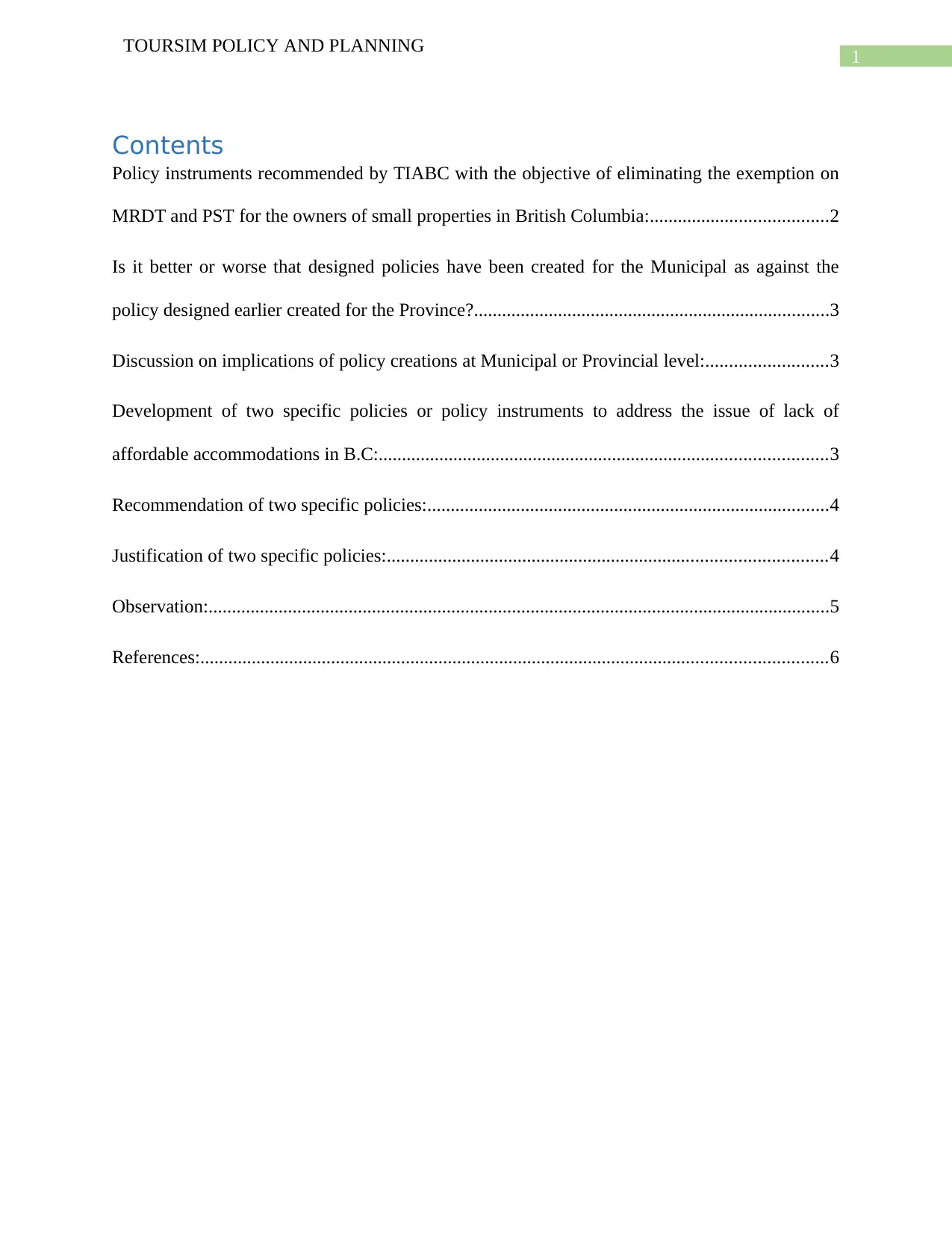
1
TOURSIM POLICY AND PLANNING
Contents
Policy instruments recommended by TIABC with the objective of eliminating the exemption on
MRDT and PST for the owners of small properties in British Columbia:......................................2
Is it better or worse that designed policies have been created for the Municipal as against the
policy designed earlier created for the Province?............................................................................3
Discussion on implications of policy creations at Municipal or Provincial level:..........................3
Development of two specific policies or policy instruments to address the issue of lack of
affordable accommodations in B.C:................................................................................................3
Recommendation of two specific policies:......................................................................................4
Justification of two specific policies:..............................................................................................4
Observation:.....................................................................................................................................5
References:......................................................................................................................................6
TOURSIM POLICY AND PLANNING
Contents
Policy instruments recommended by TIABC with the objective of eliminating the exemption on
MRDT and PST for the owners of small properties in British Columbia:......................................2
Is it better or worse that designed policies have been created for the Municipal as against the
policy designed earlier created for the Province?............................................................................3
Discussion on implications of policy creations at Municipal or Provincial level:..........................3
Development of two specific policies or policy instruments to address the issue of lack of
affordable accommodations in B.C:................................................................................................3
Recommendation of two specific policies:......................................................................................4
Justification of two specific policies:..............................................................................................4
Observation:.....................................................................................................................................5
References:......................................................................................................................................6
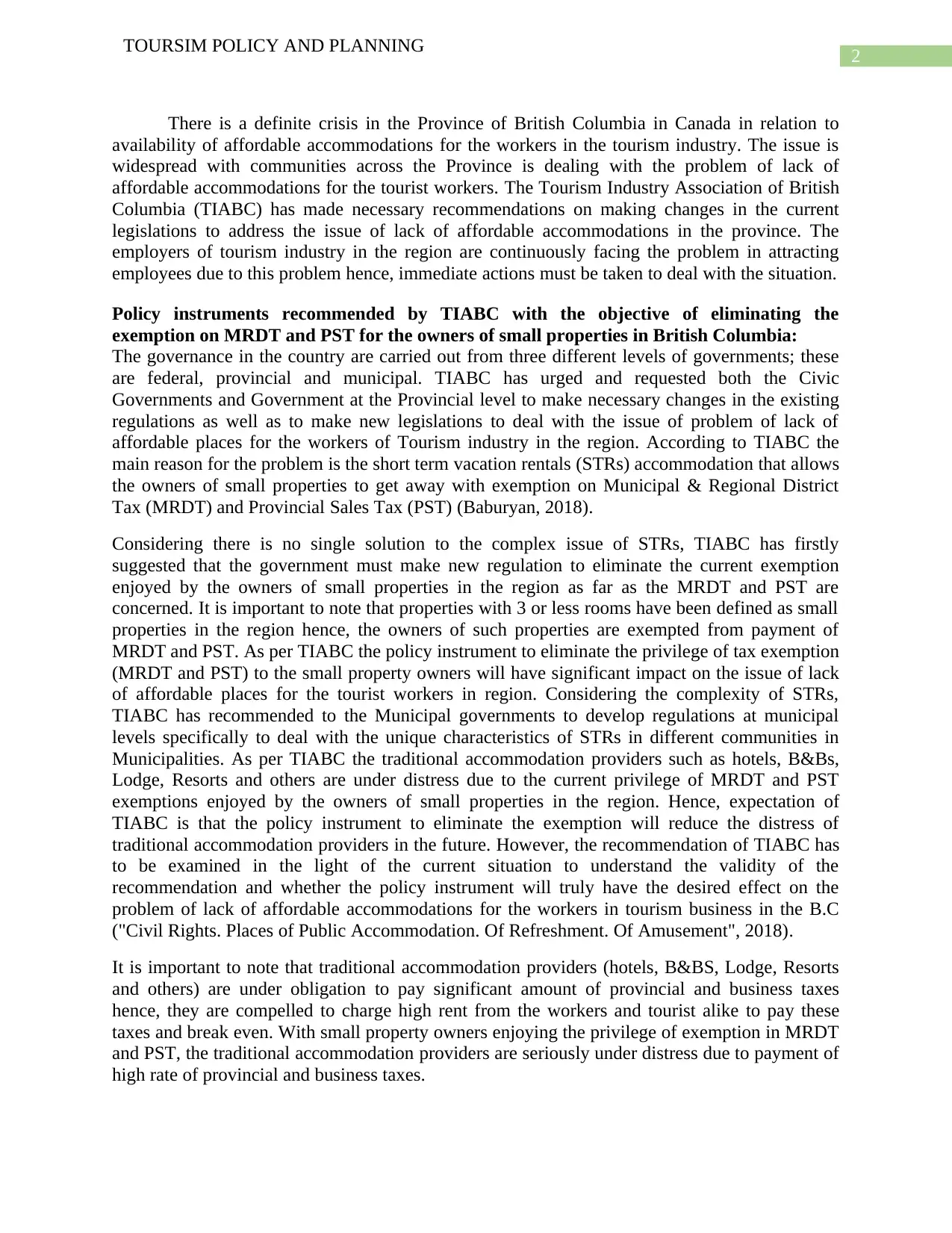
2
TOURSIM POLICY AND PLANNING
There is a definite crisis in the Province of British Columbia in Canada in relation to
availability of affordable accommodations for the workers in the tourism industry. The issue is
widespread with communities across the Province is dealing with the problem of lack of
affordable accommodations for the tourist workers. The Tourism Industry Association of British
Columbia (TIABC) has made necessary recommendations on making changes in the current
legislations to address the issue of lack of affordable accommodations in the province. The
employers of tourism industry in the region are continuously facing the problem in attracting
employees due to this problem hence, immediate actions must be taken to deal with the situation.
Policy instruments recommended by TIABC with the objective of eliminating the
exemption on MRDT and PST for the owners of small properties in British Columbia:
The governance in the country are carried out from three different levels of governments; these
are federal, provincial and municipal. TIABC has urged and requested both the Civic
Governments and Government at the Provincial level to make necessary changes in the existing
regulations as well as to make new legislations to deal with the issue of problem of lack of
affordable places for the workers of Tourism industry in the region. According to TIABC the
main reason for the problem is the short term vacation rentals (STRs) accommodation that allows
the owners of small properties to get away with exemption on Municipal & Regional District
Tax (MRDT) and Provincial Sales Tax (PST) (Baburyan, 2018).
Considering there is no single solution to the complex issue of STRs, TIABC has firstly
suggested that the government must make new regulation to eliminate the current exemption
enjoyed by the owners of small properties in the region as far as the MRDT and PST are
concerned. It is important to note that properties with 3 or less rooms have been defined as small
properties in the region hence, the owners of such properties are exempted from payment of
MRDT and PST. As per TIABC the policy instrument to eliminate the privilege of tax exemption
(MRDT and PST) to the small property owners will have significant impact on the issue of lack
of affordable places for the tourist workers in region. Considering the complexity of STRs,
TIABC has recommended to the Municipal governments to develop regulations at municipal
levels specifically to deal with the unique characteristics of STRs in different communities in
Municipalities. As per TIABC the traditional accommodation providers such as hotels, B&Bs,
Lodge, Resorts and others are under distress due to the current privilege of MRDT and PST
exemptions enjoyed by the owners of small properties in the region. Hence, expectation of
TIABC is that the policy instrument to eliminate the exemption will reduce the distress of
traditional accommodation providers in the future. However, the recommendation of TIABC has
to be examined in the light of the current situation to understand the validity of the
recommendation and whether the policy instrument will truly have the desired effect on the
problem of lack of affordable accommodations for the workers in tourism business in the B.C
("Civil Rights. Places of Public Accommodation. Of Refreshment. Of Amusement", 2018).
It is important to note that traditional accommodation providers (hotels, B&BS, Lodge, Resorts
and others) are under obligation to pay significant amount of provincial and business taxes
hence, they are compelled to charge high rent from the workers and tourist alike to pay these
taxes and break even. With small property owners enjoying the privilege of exemption in MRDT
and PST, the traditional accommodation providers are seriously under distress due to payment of
high rate of provincial and business taxes.
TOURSIM POLICY AND PLANNING
There is a definite crisis in the Province of British Columbia in Canada in relation to
availability of affordable accommodations for the workers in the tourism industry. The issue is
widespread with communities across the Province is dealing with the problem of lack of
affordable accommodations for the tourist workers. The Tourism Industry Association of British
Columbia (TIABC) has made necessary recommendations on making changes in the current
legislations to address the issue of lack of affordable accommodations in the province. The
employers of tourism industry in the region are continuously facing the problem in attracting
employees due to this problem hence, immediate actions must be taken to deal with the situation.
Policy instruments recommended by TIABC with the objective of eliminating the
exemption on MRDT and PST for the owners of small properties in British Columbia:
The governance in the country are carried out from three different levels of governments; these
are federal, provincial and municipal. TIABC has urged and requested both the Civic
Governments and Government at the Provincial level to make necessary changes in the existing
regulations as well as to make new legislations to deal with the issue of problem of lack of
affordable places for the workers of Tourism industry in the region. According to TIABC the
main reason for the problem is the short term vacation rentals (STRs) accommodation that allows
the owners of small properties to get away with exemption on Municipal & Regional District
Tax (MRDT) and Provincial Sales Tax (PST) (Baburyan, 2018).
Considering there is no single solution to the complex issue of STRs, TIABC has firstly
suggested that the government must make new regulation to eliminate the current exemption
enjoyed by the owners of small properties in the region as far as the MRDT and PST are
concerned. It is important to note that properties with 3 or less rooms have been defined as small
properties in the region hence, the owners of such properties are exempted from payment of
MRDT and PST. As per TIABC the policy instrument to eliminate the privilege of tax exemption
(MRDT and PST) to the small property owners will have significant impact on the issue of lack
of affordable places for the tourist workers in region. Considering the complexity of STRs,
TIABC has recommended to the Municipal governments to develop regulations at municipal
levels specifically to deal with the unique characteristics of STRs in different communities in
Municipalities. As per TIABC the traditional accommodation providers such as hotels, B&Bs,
Lodge, Resorts and others are under distress due to the current privilege of MRDT and PST
exemptions enjoyed by the owners of small properties in the region. Hence, expectation of
TIABC is that the policy instrument to eliminate the exemption will reduce the distress of
traditional accommodation providers in the future. However, the recommendation of TIABC has
to be examined in the light of the current situation to understand the validity of the
recommendation and whether the policy instrument will truly have the desired effect on the
problem of lack of affordable accommodations for the workers in tourism business in the B.C
("Civil Rights. Places of Public Accommodation. Of Refreshment. Of Amusement", 2018).
It is important to note that traditional accommodation providers (hotels, B&BS, Lodge, Resorts
and others) are under obligation to pay significant amount of provincial and business taxes
hence, they are compelled to charge high rent from the workers and tourist alike to pay these
taxes and break even. With small property owners enjoying the privilege of exemption in MRDT
and PST, the traditional accommodation providers are seriously under distress due to payment of
high rate of provincial and business taxes.
⊘ This is a preview!⊘
Do you want full access?
Subscribe today to unlock all pages.

Trusted by 1+ million students worldwide
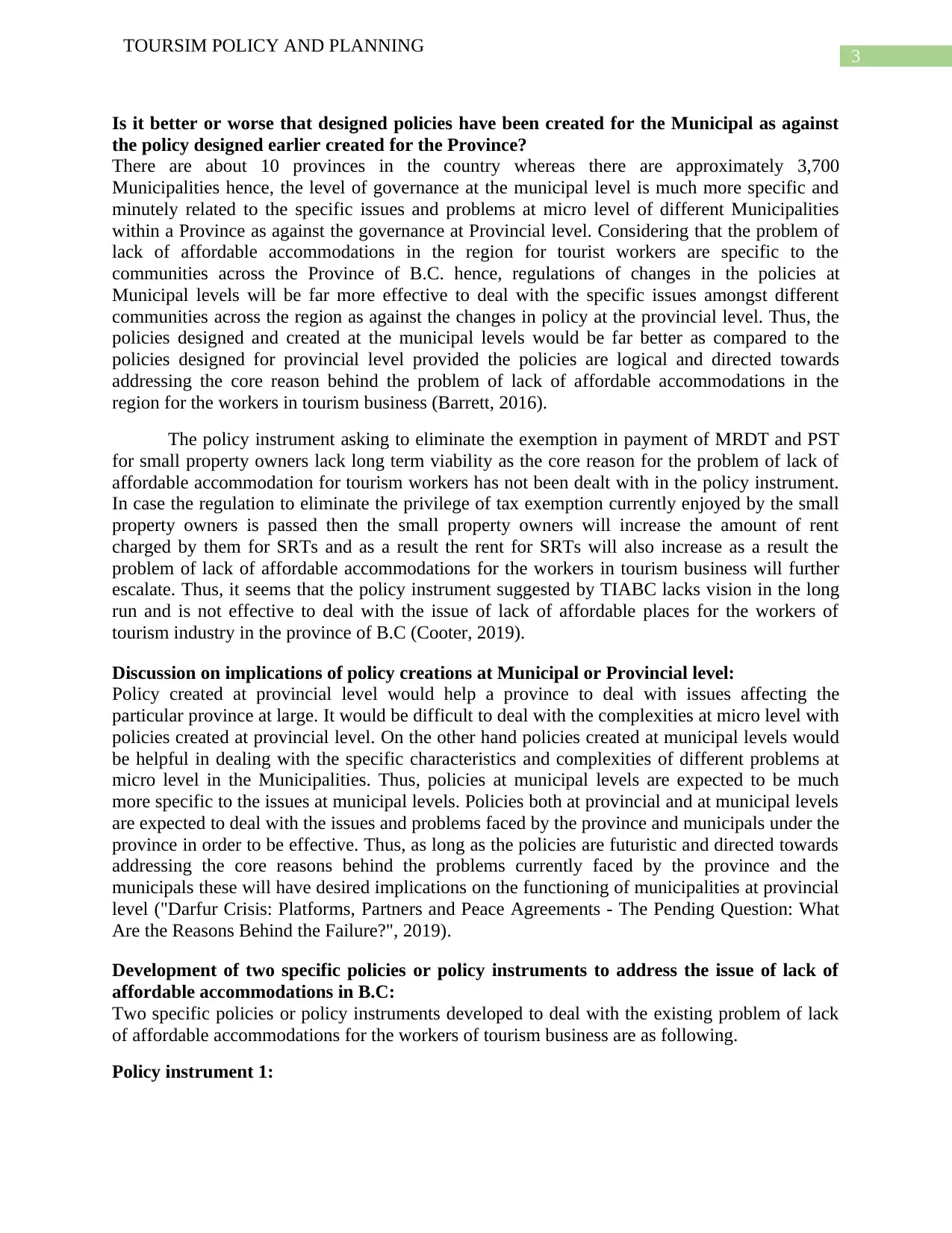
3
TOURSIM POLICY AND PLANNING
Is it better or worse that designed policies have been created for the Municipal as against
the policy designed earlier created for the Province?
There are about 10 provinces in the country whereas there are approximately 3,700
Municipalities hence, the level of governance at the municipal level is much more specific and
minutely related to the specific issues and problems at micro level of different Municipalities
within a Province as against the governance at Provincial level. Considering that the problem of
lack of affordable accommodations in the region for tourist workers are specific to the
communities across the Province of B.C. hence, regulations of changes in the policies at
Municipal levels will be far more effective to deal with the specific issues amongst different
communities across the region as against the changes in policy at the provincial level. Thus, the
policies designed and created at the municipal levels would be far better as compared to the
policies designed for provincial level provided the policies are logical and directed towards
addressing the core reason behind the problem of lack of affordable accommodations in the
region for the workers in tourism business (Barrett, 2016).
The policy instrument asking to eliminate the exemption in payment of MRDT and PST
for small property owners lack long term viability as the core reason for the problem of lack of
affordable accommodation for tourism workers has not been dealt with in the policy instrument.
In case the regulation to eliminate the privilege of tax exemption currently enjoyed by the small
property owners is passed then the small property owners will increase the amount of rent
charged by them for SRTs and as a result the rent for SRTs will also increase as a result the
problem of lack of affordable accommodations for the workers in tourism business will further
escalate. Thus, it seems that the policy instrument suggested by TIABC lacks vision in the long
run and is not effective to deal with the issue of lack of affordable places for the workers of
tourism industry in the province of B.C (Cooter, 2019).
Discussion on implications of policy creations at Municipal or Provincial level:
Policy created at provincial level would help a province to deal with issues affecting the
particular province at large. It would be difficult to deal with the complexities at micro level with
policies created at provincial level. On the other hand policies created at municipal levels would
be helpful in dealing with the specific characteristics and complexities of different problems at
micro level in the Municipalities. Thus, policies at municipal levels are expected to be much
more specific to the issues at municipal levels. Policies both at provincial and at municipal levels
are expected to deal with the issues and problems faced by the province and municipals under the
province in order to be effective. Thus, as long as the policies are futuristic and directed towards
addressing the core reasons behind the problems currently faced by the province and the
municipals these will have desired implications on the functioning of municipalities at provincial
level ("Darfur Crisis: Platforms, Partners and Peace Agreements - The Pending Question: What
Are the Reasons Behind the Failure?", 2019).
Development of two specific policies or policy instruments to address the issue of lack of
affordable accommodations in B.C:
Two specific policies or policy instruments developed to deal with the existing problem of lack
of affordable accommodations for the workers of tourism business are as following.
Policy instrument 1:
TOURSIM POLICY AND PLANNING
Is it better or worse that designed policies have been created for the Municipal as against
the policy designed earlier created for the Province?
There are about 10 provinces in the country whereas there are approximately 3,700
Municipalities hence, the level of governance at the municipal level is much more specific and
minutely related to the specific issues and problems at micro level of different Municipalities
within a Province as against the governance at Provincial level. Considering that the problem of
lack of affordable accommodations in the region for tourist workers are specific to the
communities across the Province of B.C. hence, regulations of changes in the policies at
Municipal levels will be far more effective to deal with the specific issues amongst different
communities across the region as against the changes in policy at the provincial level. Thus, the
policies designed and created at the municipal levels would be far better as compared to the
policies designed for provincial level provided the policies are logical and directed towards
addressing the core reason behind the problem of lack of affordable accommodations in the
region for the workers in tourism business (Barrett, 2016).
The policy instrument asking to eliminate the exemption in payment of MRDT and PST
for small property owners lack long term viability as the core reason for the problem of lack of
affordable accommodation for tourism workers has not been dealt with in the policy instrument.
In case the regulation to eliminate the privilege of tax exemption currently enjoyed by the small
property owners is passed then the small property owners will increase the amount of rent
charged by them for SRTs and as a result the rent for SRTs will also increase as a result the
problem of lack of affordable accommodations for the workers in tourism business will further
escalate. Thus, it seems that the policy instrument suggested by TIABC lacks vision in the long
run and is not effective to deal with the issue of lack of affordable places for the workers of
tourism industry in the province of B.C (Cooter, 2019).
Discussion on implications of policy creations at Municipal or Provincial level:
Policy created at provincial level would help a province to deal with issues affecting the
particular province at large. It would be difficult to deal with the complexities at micro level with
policies created at provincial level. On the other hand policies created at municipal levels would
be helpful in dealing with the specific characteristics and complexities of different problems at
micro level in the Municipalities. Thus, policies at municipal levels are expected to be much
more specific to the issues at municipal levels. Policies both at provincial and at municipal levels
are expected to deal with the issues and problems faced by the province and municipals under the
province in order to be effective. Thus, as long as the policies are futuristic and directed towards
addressing the core reasons behind the problems currently faced by the province and the
municipals these will have desired implications on the functioning of municipalities at provincial
level ("Darfur Crisis: Platforms, Partners and Peace Agreements - The Pending Question: What
Are the Reasons Behind the Failure?", 2019).
Development of two specific policies or policy instruments to address the issue of lack of
affordable accommodations in B.C:
Two specific policies or policy instruments developed to deal with the existing problem of lack
of affordable accommodations for the workers of tourism business are as following.
Policy instrument 1:
Paraphrase This Document
Need a fresh take? Get an instant paraphrase of this document with our AI Paraphraser
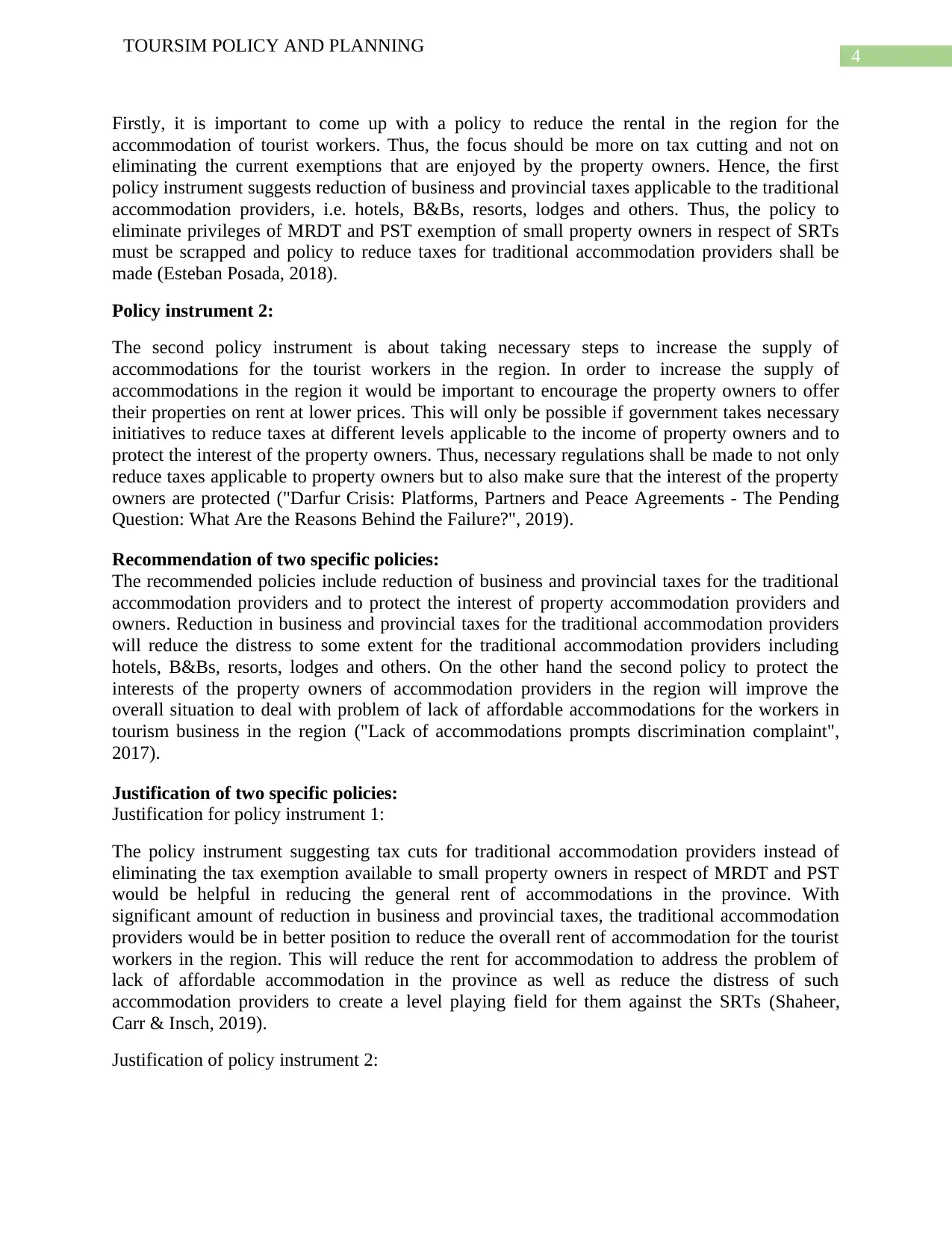
4
TOURSIM POLICY AND PLANNING
Firstly, it is important to come up with a policy to reduce the rental in the region for the
accommodation of tourist workers. Thus, the focus should be more on tax cutting and not on
eliminating the current exemptions that are enjoyed by the property owners. Hence, the first
policy instrument suggests reduction of business and provincial taxes applicable to the traditional
accommodation providers, i.e. hotels, B&Bs, resorts, lodges and others. Thus, the policy to
eliminate privileges of MRDT and PST exemption of small property owners in respect of SRTs
must be scrapped and policy to reduce taxes for traditional accommodation providers shall be
made (Esteban Posada, 2018).
Policy instrument 2:
The second policy instrument is about taking necessary steps to increase the supply of
accommodations for the tourist workers in the region. In order to increase the supply of
accommodations in the region it would be important to encourage the property owners to offer
their properties on rent at lower prices. This will only be possible if government takes necessary
initiatives to reduce taxes at different levels applicable to the income of property owners and to
protect the interest of the property owners. Thus, necessary regulations shall be made to not only
reduce taxes applicable to property owners but to also make sure that the interest of the property
owners are protected ("Darfur Crisis: Platforms, Partners and Peace Agreements - The Pending
Question: What Are the Reasons Behind the Failure?", 2019).
Recommendation of two specific policies:
The recommended policies include reduction of business and provincial taxes for the traditional
accommodation providers and to protect the interest of property accommodation providers and
owners. Reduction in business and provincial taxes for the traditional accommodation providers
will reduce the distress to some extent for the traditional accommodation providers including
hotels, B&Bs, resorts, lodges and others. On the other hand the second policy to protect the
interests of the property owners of accommodation providers in the region will improve the
overall situation to deal with problem of lack of affordable accommodations for the workers in
tourism business in the region ("Lack of accommodations prompts discrimination complaint",
2017).
Justification of two specific policies:
Justification for policy instrument 1:
The policy instrument suggesting tax cuts for traditional accommodation providers instead of
eliminating the tax exemption available to small property owners in respect of MRDT and PST
would be helpful in reducing the general rent of accommodations in the province. With
significant amount of reduction in business and provincial taxes, the traditional accommodation
providers would be in better position to reduce the overall rent of accommodation for the tourist
workers in the region. This will reduce the rent for accommodation to address the problem of
lack of affordable accommodation in the province as well as reduce the distress of such
accommodation providers to create a level playing field for them against the SRTs (Shaheer,
Carr & Insch, 2019).
Justification of policy instrument 2:
TOURSIM POLICY AND PLANNING
Firstly, it is important to come up with a policy to reduce the rental in the region for the
accommodation of tourist workers. Thus, the focus should be more on tax cutting and not on
eliminating the current exemptions that are enjoyed by the property owners. Hence, the first
policy instrument suggests reduction of business and provincial taxes applicable to the traditional
accommodation providers, i.e. hotels, B&Bs, resorts, lodges and others. Thus, the policy to
eliminate privileges of MRDT and PST exemption of small property owners in respect of SRTs
must be scrapped and policy to reduce taxes for traditional accommodation providers shall be
made (Esteban Posada, 2018).
Policy instrument 2:
The second policy instrument is about taking necessary steps to increase the supply of
accommodations for the tourist workers in the region. In order to increase the supply of
accommodations in the region it would be important to encourage the property owners to offer
their properties on rent at lower prices. This will only be possible if government takes necessary
initiatives to reduce taxes at different levels applicable to the income of property owners and to
protect the interest of the property owners. Thus, necessary regulations shall be made to not only
reduce taxes applicable to property owners but to also make sure that the interest of the property
owners are protected ("Darfur Crisis: Platforms, Partners and Peace Agreements - The Pending
Question: What Are the Reasons Behind the Failure?", 2019).
Recommendation of two specific policies:
The recommended policies include reduction of business and provincial taxes for the traditional
accommodation providers and to protect the interest of property accommodation providers and
owners. Reduction in business and provincial taxes for the traditional accommodation providers
will reduce the distress to some extent for the traditional accommodation providers including
hotels, B&Bs, resorts, lodges and others. On the other hand the second policy to protect the
interests of the property owners of accommodation providers in the region will improve the
overall situation to deal with problem of lack of affordable accommodations for the workers in
tourism business in the region ("Lack of accommodations prompts discrimination complaint",
2017).
Justification of two specific policies:
Justification for policy instrument 1:
The policy instrument suggesting tax cuts for traditional accommodation providers instead of
eliminating the tax exemption available to small property owners in respect of MRDT and PST
would be helpful in reducing the general rent of accommodations in the province. With
significant amount of reduction in business and provincial taxes, the traditional accommodation
providers would be in better position to reduce the overall rent of accommodation for the tourist
workers in the region. This will reduce the rent for accommodation to address the problem of
lack of affordable accommodation in the province as well as reduce the distress of such
accommodation providers to create a level playing field for them against the SRTs (Shaheer,
Carr & Insch, 2019).
Justification of policy instrument 2:
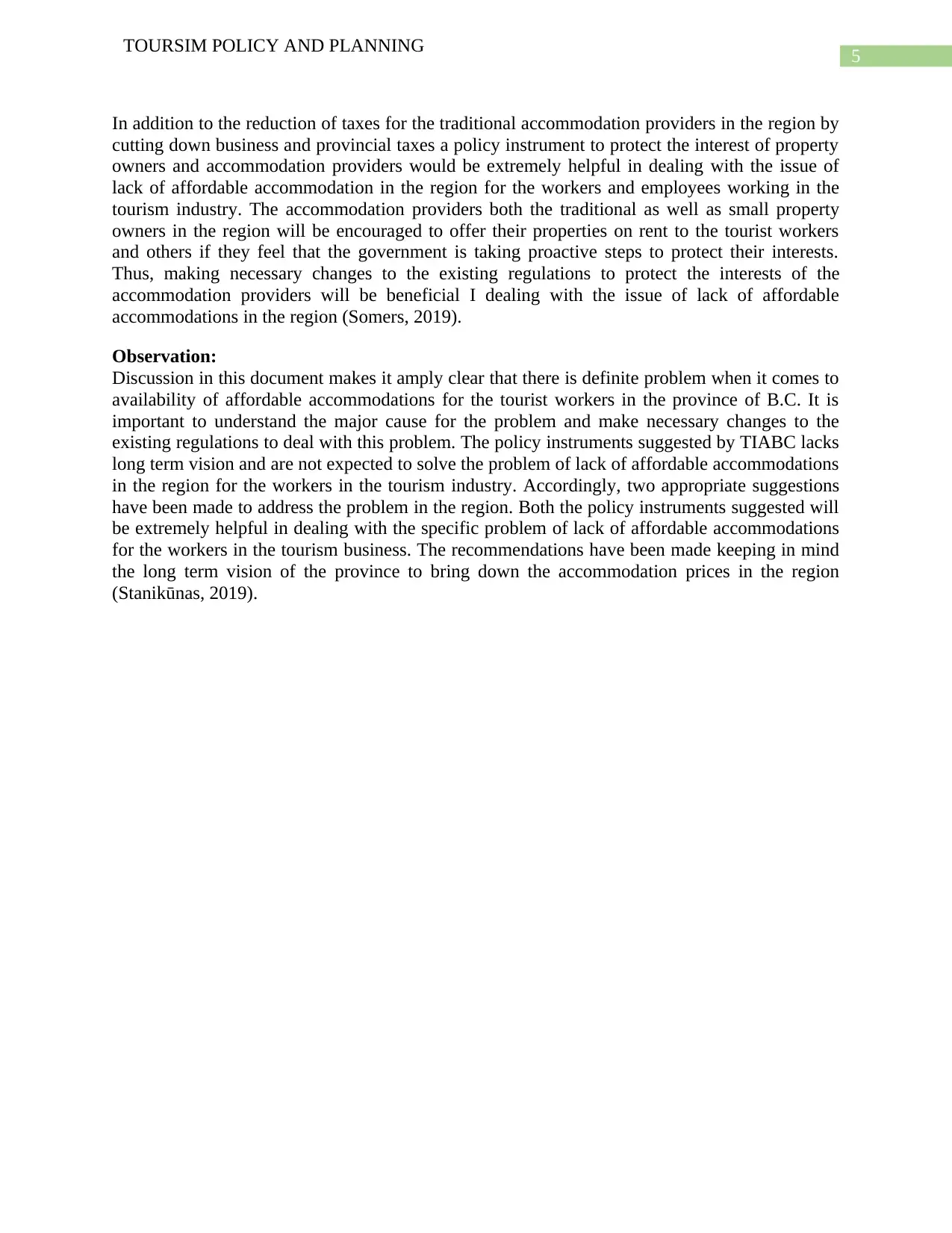
5
TOURSIM POLICY AND PLANNING
In addition to the reduction of taxes for the traditional accommodation providers in the region by
cutting down business and provincial taxes a policy instrument to protect the interest of property
owners and accommodation providers would be extremely helpful in dealing with the issue of
lack of affordable accommodation in the region for the workers and employees working in the
tourism industry. The accommodation providers both the traditional as well as small property
owners in the region will be encouraged to offer their properties on rent to the tourist workers
and others if they feel that the government is taking proactive steps to protect their interests.
Thus, making necessary changes to the existing regulations to protect the interests of the
accommodation providers will be beneficial I dealing with the issue of lack of affordable
accommodations in the region (Somers, 2019).
Observation:
Discussion in this document makes it amply clear that there is definite problem when it comes to
availability of affordable accommodations for the tourist workers in the province of B.C. It is
important to understand the major cause for the problem and make necessary changes to the
existing regulations to deal with this problem. The policy instruments suggested by TIABC lacks
long term vision and are not expected to solve the problem of lack of affordable accommodations
in the region for the workers in the tourism industry. Accordingly, two appropriate suggestions
have been made to address the problem in the region. Both the policy instruments suggested will
be extremely helpful in dealing with the specific problem of lack of affordable accommodations
for the workers in the tourism business. The recommendations have been made keeping in mind
the long term vision of the province to bring down the accommodation prices in the region
(Stanikūnas, 2019).
TOURSIM POLICY AND PLANNING
In addition to the reduction of taxes for the traditional accommodation providers in the region by
cutting down business and provincial taxes a policy instrument to protect the interest of property
owners and accommodation providers would be extremely helpful in dealing with the issue of
lack of affordable accommodation in the region for the workers and employees working in the
tourism industry. The accommodation providers both the traditional as well as small property
owners in the region will be encouraged to offer their properties on rent to the tourist workers
and others if they feel that the government is taking proactive steps to protect their interests.
Thus, making necessary changes to the existing regulations to protect the interests of the
accommodation providers will be beneficial I dealing with the issue of lack of affordable
accommodations in the region (Somers, 2019).
Observation:
Discussion in this document makes it amply clear that there is definite problem when it comes to
availability of affordable accommodations for the tourist workers in the province of B.C. It is
important to understand the major cause for the problem and make necessary changes to the
existing regulations to deal with this problem. The policy instruments suggested by TIABC lacks
long term vision and are not expected to solve the problem of lack of affordable accommodations
in the region for the workers in the tourism industry. Accordingly, two appropriate suggestions
have been made to address the problem in the region. Both the policy instruments suggested will
be extremely helpful in dealing with the specific problem of lack of affordable accommodations
for the workers in the tourism business. The recommendations have been made keeping in mind
the long term vision of the province to bring down the accommodation prices in the region
(Stanikūnas, 2019).
⊘ This is a preview!⊘
Do you want full access?
Subscribe today to unlock all pages.

Trusted by 1+ million students worldwide
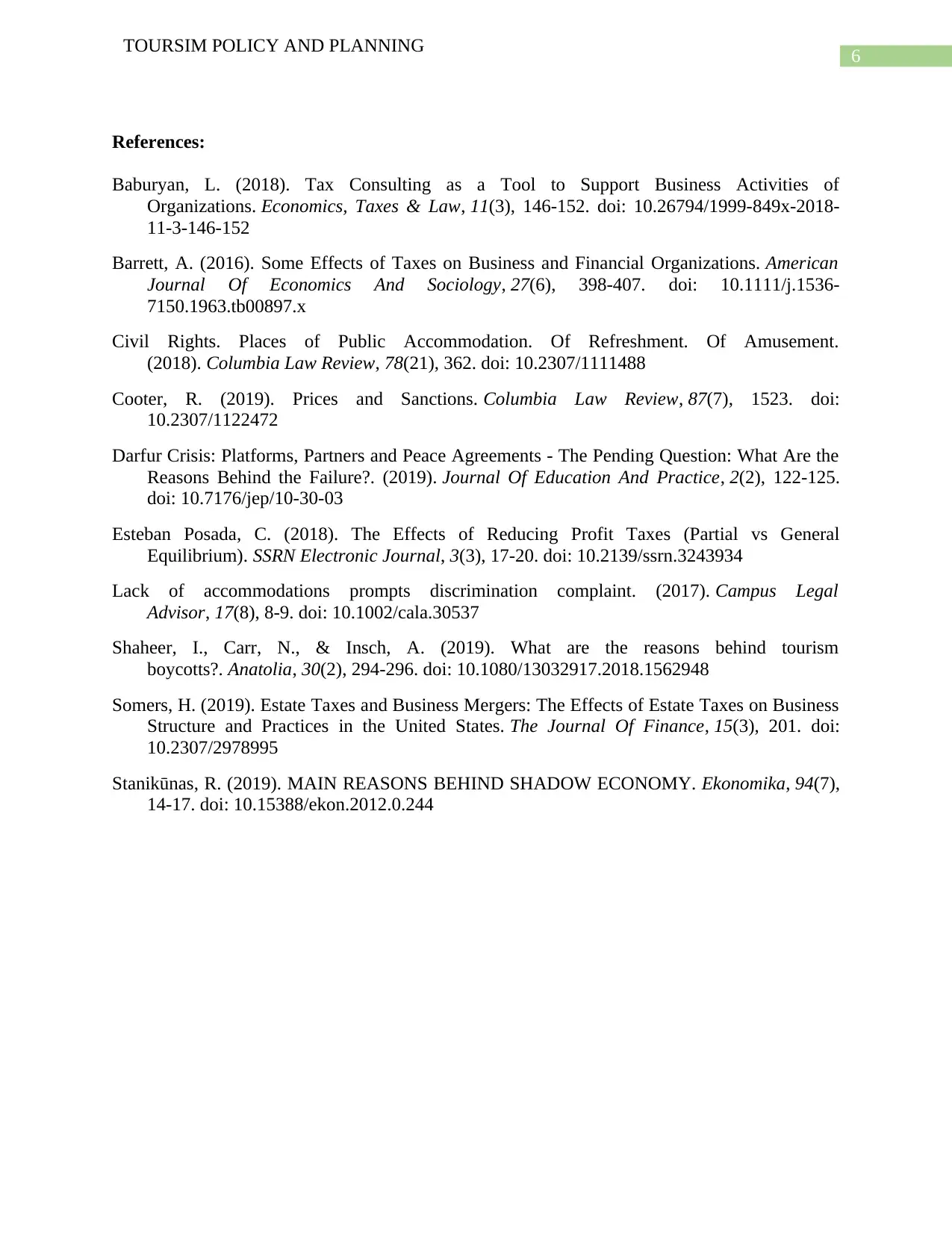
6
TOURSIM POLICY AND PLANNING
References:
Baburyan, L. (2018). Tax Consulting as a Tool to Support Business Activities of
Organizations. Economics, Taxes & Law, 11(3), 146-152. doi: 10.26794/1999-849x-2018-
11-3-146-152
Barrett, A. (2016). Some Effects of Taxes on Business and Financial Organizations. American
Journal Of Economics And Sociology, 27(6), 398-407. doi: 10.1111/j.1536-
7150.1963.tb00897.x
Civil Rights. Places of Public Accommodation. Of Refreshment. Of Amusement.
(2018). Columbia Law Review, 78(21), 362. doi: 10.2307/1111488
Cooter, R. (2019). Prices and Sanctions. Columbia Law Review, 87(7), 1523. doi:
10.2307/1122472
Darfur Crisis: Platforms, Partners and Peace Agreements - The Pending Question: What Are the
Reasons Behind the Failure?. (2019). Journal Of Education And Practice, 2(2), 122-125.
doi: 10.7176/jep/10-30-03
Esteban Posada, C. (2018). The Effects of Reducing Profit Taxes (Partial vs General
Equilibrium). SSRN Electronic Journal, 3(3), 17-20. doi: 10.2139/ssrn.3243934
Lack of accommodations prompts discrimination complaint. (2017). Campus Legal
Advisor, 17(8), 8-9. doi: 10.1002/cala.30537
Shaheer, I., Carr, N., & Insch, A. (2019). What are the reasons behind tourism
boycotts?. Anatolia, 30(2), 294-296. doi: 10.1080/13032917.2018.1562948
Somers, H. (2019). Estate Taxes and Business Mergers: The Effects of Estate Taxes on Business
Structure and Practices in the United States. The Journal Of Finance, 15(3), 201. doi:
10.2307/2978995
Stanikūnas, R. (2019). MAIN REASONS BEHIND SHADOW ECONOMY. Ekonomika, 94(7),
14-17. doi: 10.15388/ekon.2012.0.244
TOURSIM POLICY AND PLANNING
References:
Baburyan, L. (2018). Tax Consulting as a Tool to Support Business Activities of
Organizations. Economics, Taxes & Law, 11(3), 146-152. doi: 10.26794/1999-849x-2018-
11-3-146-152
Barrett, A. (2016). Some Effects of Taxes on Business and Financial Organizations. American
Journal Of Economics And Sociology, 27(6), 398-407. doi: 10.1111/j.1536-
7150.1963.tb00897.x
Civil Rights. Places of Public Accommodation. Of Refreshment. Of Amusement.
(2018). Columbia Law Review, 78(21), 362. doi: 10.2307/1111488
Cooter, R. (2019). Prices and Sanctions. Columbia Law Review, 87(7), 1523. doi:
10.2307/1122472
Darfur Crisis: Platforms, Partners and Peace Agreements - The Pending Question: What Are the
Reasons Behind the Failure?. (2019). Journal Of Education And Practice, 2(2), 122-125.
doi: 10.7176/jep/10-30-03
Esteban Posada, C. (2018). The Effects of Reducing Profit Taxes (Partial vs General
Equilibrium). SSRN Electronic Journal, 3(3), 17-20. doi: 10.2139/ssrn.3243934
Lack of accommodations prompts discrimination complaint. (2017). Campus Legal
Advisor, 17(8), 8-9. doi: 10.1002/cala.30537
Shaheer, I., Carr, N., & Insch, A. (2019). What are the reasons behind tourism
boycotts?. Anatolia, 30(2), 294-296. doi: 10.1080/13032917.2018.1562948
Somers, H. (2019). Estate Taxes and Business Mergers: The Effects of Estate Taxes on Business
Structure and Practices in the United States. The Journal Of Finance, 15(3), 201. doi:
10.2307/2978995
Stanikūnas, R. (2019). MAIN REASONS BEHIND SHADOW ECONOMY. Ekonomika, 94(7),
14-17. doi: 10.15388/ekon.2012.0.244
1 out of 7
Related Documents
Your All-in-One AI-Powered Toolkit for Academic Success.
+13062052269
info@desklib.com
Available 24*7 on WhatsApp / Email
![[object Object]](/_next/static/media/star-bottom.7253800d.svg)
Unlock your academic potential
Copyright © 2020–2025 A2Z Services. All Rights Reserved. Developed and managed by ZUCOL.





